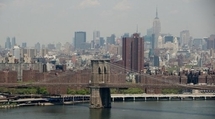
The New York skyline
Preska on Monday ruled in favor of prosecutors who wanted jurors' identities to be kept secret because of the seriousness of Hashmi's alleged role in supplying Al-Qaeda fighters combating US forces in Afghanistan.
However, human rights groups say the unusual measure adds to the impossibility of Hashmi, 30, receiving a fair trial.
Hashmi was arrested in Britain in 2006 and extradited the following year to face charges that he provided material support to Osama bin Laden's loose-knit international militant group.
Hashmi, born in Pakistan and educated in New York, has pleaded not guilty.
The authorities allege he allowed a terrorism suspect to stay in his student apartment in London and allowed the man to use his cell phone to call other suspects.
The guest also had a supply of rain gear, such as ponchos and waterproof socks, that was allegedly being delivered to Al-Qaeda in Pakistan.
Human rights groups including Amnesty International and the Center for Constitutional Rights, say Hashmi has been subjected to harsh pre-trial detention and not been allowed to prepare properly for his defense.
The Center for Constitutional Rights slammed the "extremely harsh conditions of confinement Mr Hashmi has faced for three years... under regulations called Special Administrative Measures (SAMs), their impact on his mental health, and his ability to effectively participate in his own defense."
The group, which is prominent in challenging alleged rights abuses in what is commonly known in the United States as the "war on terror," also criticized the court's decision to order an anonymous jury.
This was "a clear attempt to influence the jury by creating a sense of fear for their safety and to paint Mr Hashmi as already guilty," the group said.
---------------------------------------------------------------------------
However, human rights groups say the unusual measure adds to the impossibility of Hashmi, 30, receiving a fair trial.
Hashmi was arrested in Britain in 2006 and extradited the following year to face charges that he provided material support to Osama bin Laden's loose-knit international militant group.
Hashmi, born in Pakistan and educated in New York, has pleaded not guilty.
The authorities allege he allowed a terrorism suspect to stay in his student apartment in London and allowed the man to use his cell phone to call other suspects.
The guest also had a supply of rain gear, such as ponchos and waterproof socks, that was allegedly being delivered to Al-Qaeda in Pakistan.
Human rights groups including Amnesty International and the Center for Constitutional Rights, say Hashmi has been subjected to harsh pre-trial detention and not been allowed to prepare properly for his defense.
The Center for Constitutional Rights slammed the "extremely harsh conditions of confinement Mr Hashmi has faced for three years... under regulations called Special Administrative Measures (SAMs), their impact on his mental health, and his ability to effectively participate in his own defense."
The group, which is prominent in challenging alleged rights abuses in what is commonly known in the United States as the "war on terror," also criticized the court's decision to order an anonymous jury.
This was "a clear attempt to influence the jury by creating a sense of fear for their safety and to paint Mr Hashmi as already guilty," the group said.
---------------------------------------------------------------------------









 Home
Home Politics
Politics









